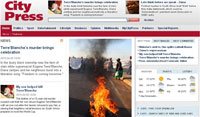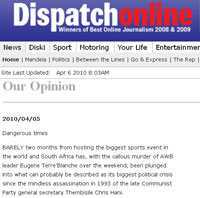
Mandy de Waal
Here, media analyst Wadim Schreiner has reverse-engineered the news in a conversation with MandyLives!com. Shreiner's an amateur political analyst but a frequent media commentator. He's the MD of Media Tenor South Africa and a partner in Media Tenor International (Switzerland).

Wadim Schreiner
MandyLives!com: What's your view on the media coverage of Eugene Terre'Blanche's murder?
Wadim Schreiner: There was loads of coverage, considerably more than I thought the event deserved. I did not think it was that significant an event, but rather that it was propelled into being a significant news event by the context it happened in. I expected some of the media to say that Terre'Blanche was a racist and a violent person, and that his death didn't deserve the level of coverage it achieved. However, it was seen as a big news story, but that was driven by the context of the story and not the person (Eugene Terre'Blanche) per se.
The coverage of the event was mixed - there was some excellent reporting and some dubious media work. However, this was very influenced by the time the story broke, which was slap bang in the middle of the Easter weekend and way past the editorial deadlines of most publications. Rapport's coverage was excellent because it took significant effort, mobilised resources and got diverse views. It spoke to a lot of people, had a lot of sources and displayed good thinking with a lot of different angles. City Press also did a good job, while Sunday Times predictably went for the more sensationalist route.
ML: How has the Internet changed the nature of news and analysis?
WS: The Internet has changed things dramatically. I am not sure who broke the Terre'Blanche news [ML: the news was first broken on Twitter by blogger @fromtheold at 10.18pm on 3 April 2010, then picked up by 702's Aki Anastasiou at 10.22 PM with a link to From The Old's blog. Mail & Guardian editor-in-chief @NicDawes posted a tweet on the breaking news at 10.32pm. Anastasiou posted SAPS confirmation at 10.42pm] but I picked it up on Twitter, which tends to drive discussions rather than merely presenting information. The discussion on Twitter centered on what may happen to South Africa, and I found this far more reasonable and healthy than the editorial that was displayed in the traditional press.
The traditional press was very hysterical and sensationalist. Reading newspapers you would have thought South Africa was on the brink of civil war or at the precipice of a huge race war. The traditional news media went for massive hype, with very little real news or intelligent commentary.
This is because in the traditional media it is so important to come out first and have the breaking story. The challenge is that, if something big happens and there's little information, there's huge pressure to do something exceptional in a very short space of time. Because of lack of information we saw the sensation. The time factor of the story played a major role. In that short space it is very easy to go with a more emotional angle, rather than an objective, more broadly sourced or analytical angle.
ML: Did the media collectively smack their lips when the news broke?
WS:I doubt the media thought of the story as a means to make an extra buck [certainly not what I saw from the media in my twitter stream on Saturday night - managing ed. In the situation they were in, they didn't really have a unique position or scoop. The reaction from the media largely mirrored the frustration in South Africa about the context of the story. With Malema and the challenges regarding our lack of social cohesion as a background, the story was served up to the media on a silver platter. It was an excellent story to use as a vehicle for pointing out the social ills and great divides that exist in South Africa.
ML: Stories from Ventersdorp (Daily Maverick/Phillip de Wet) tell of the BBC targeting conservatives for vox pops. What happened to objectivity? What does this say about South Africa and the international media agenda?
WS:The majority of the international media is very driven by stereotypes. They are looking for information to confirm the conventions they hold, and our analysis shows this again and again. The story is big internationally however the international media largely just do not understand the race in South Africa, nor the discussions and nuances about this issue.
I'm not surprised that they are deliberately getting commentary of a stereotyped nature because it is outside their framework to do anything else. We saw this with the tabloid media coverage of Zuma's visit to the UK. The English press and most of the international media like to portray South Africa as a place of turmoil where society is fraught and social justice is disregarded. They play the same old stereotype over and over because they can't or won't understand us.
ML: What's your view on the #IgnoreJulius Twitter campaign?
WS:I've been wondering about Malema for a while and whether it's a case of the cat biting its own tale. If you cut off the Malema's airtime, I doubt the issues change. Then there's the fact that it is the media's job to report on news. You can't go en masse and deliberately decide that you don't want specific information or will ignore certain news. I have serious doubt whether this will have any impact. It is the media's job to report on those who shout the odds and speak controversially. It's a noble idea but it won't gain traction.
Malema fulfills all the criteria of newsworthiness, whether you like him or not. He's polarising, edgy, filled with scandal, in your face, and causes sensation. You can't deliberately ignore him because some people don't like him. Yes, he gets media coverage undeservedly, is to a degree a media creation and has dubious political credentials and an unsound track record. Yes, he gets too much coverage in the absence of other issues; however, the media love personalities and Malema is a big face.
There aren't enough other faces that are telling the story. Who else is out there propagating a story? Who are the source leaders? There's Jonathan Jansen but he's very intellectual. Let's face it: we have very few populists who will stand up and be counted. There is an intelligentsia debate circling the elite, but on the ground there's no one and Malema fills the gap simply because there's nobody else. This poses a serious challenge because those who stand on the roof and are shouting the odds seem to be getting all the coverage.
It's not a matter of silencing Malema; rather it's a matter of finding Malema's competition. We need other people who are populists and who will stand up and be counted. People who appeal to the masses who are courageous enough to stand up and face Malema head on.
Adapted from original blog post published on Mandylives!com on 6 April 2010.
For more:






























![Today, Halo and Demographica announce a new specialist agency, Second Rodeo]], headed up by Mike Stopforth (left). Dean Oelschig, managing partner and founder of Halo (right) says they will work as a group but ultimately, each agency will be an individual specialist](https://biz-file.com/c/2505/772543-64x64.jpg?2)







